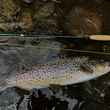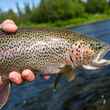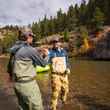At some point, old bones and the desire to have more “stuff” with you when you venture afield will win out. You may be a mountain goat now, able to boulder hop your way up a tight canyon or hike five miles before you make your first fly cast over wild trout, but you just wait. That high-school football knee injury? The slip-and-fall on the ice all those years ago? The lower back that just “goes out” for no particular reason?
All that catches up with you, and sleeping on the ground in a tent, if it’s not already something you despise, will seem less appealing. And having everything you “need” in the back of the truck will take a back seat to having everything you want.
That’s when you’ll stop being the angler who despises the idea of a “house on wheels” being pulled behind your truck, and start being one of those RV-curious folks who no longer looks at guys like me with disdain, but, perhaps, with a touch of grudging envy. For I’m the guy, now, who can go pretty much anywhere I used to go, but with a few more luxuries literally in tow.
How did it happen for me? The answer is simple. I got older and less nimble. And my back got so bad, that sleeping on the ground, even with a sleeping mat and the coziest of sleeping bags, made the next day an exercise in untying a tippet knot, only involving the muscles and nerves along my spine. I’d wake up a mess and I’d improve only slightly as the day went on. Two or three nights like that, and I was done, no matter how good the fishing was.
Couple age and the old injuries that finally caught up with me with the ability to enjoy just a few modest comforts of home (like an indoor privy or a propane-powered refrigerator or a quick rinse-off shower), and the benefits of owning and using a camper became more evident. Several years back, I took a sabbatical from work — I had the better part of three months to go and do and experience. So I bought a small camper — a 15-footer with a hybrid tent “pull-out” — and drove from Idaho Falls all the way to the Arctic and back again.
Best purchase ever
It didn’t take me long to figure out that I had stumbled into perhaps the best purchase of my life. The small camper that I still own and use to this day is equipped with a modest kitchen, a small fridge, a water tank that holds 30 gallons of fresh water and some basic plumbing. It’s “lifted,” meaning the axle is “flipped,” which gives me a lot of ground clearance, and, when weighed dry, comes in right at 3,000 pounds. At the time, the vehicle I used to tow the little trailer was rated to tow 5,000 pounds, and, when I added all of my accoutrements, both into the vehicle and in the camper, complete with a full water tank, I likely got close.
But, of course, it’s not as simple as just going out and buying a trailer. Knowing what I know now, would I have made some different choices? Certainly. But, on the whole, buying this tool — for that is surely what it is — was one of the best decisions I ever made. Not only did it serve me well on the Alaska Highway and over the Haul Road to the tundra, it serves me well today. Say what you will about RVs and their much-deserved spot near the top of the list of annoyances for folks who recreate, they are engineering marvels that can turn a day trip into a weeklong experience with just a bit of extra work. I’m sure boat owners would agree — as much of a headache as they can be, they pay for themselves not in traditional currency, but in experiential accumulation.
And, of course, it all depends on how you use the camper you choose. Here in the Rockies, we live in “boondock” paradise (free, dispersed camping is available on public lands in every single western state, and Alaska, and so long as you can dry camp or “boondock,” you can stay in some places for as long as 16 days). I probably spend between 40 and 60 nights a “season” camped for free on public lands near trout water. There is no doubt that my little camper has paid for itself, at least in terms of the currency I value the most.
In other places around the country, dispersed camping isn’t a thing — you’ll need to make reservations, find a place with “hookups” (electricity, water, sewer and sometimes even cable TV) and pay for the privilege. State parks are good bets, and some offer all of the above-listed amenities for a modest nightly fee that likely runs in the $35-$50 range. And, the longer you stay, the smaller the fee. If it gets you closer to — or literally on — the water, this might be an expense you’re willing to suffer.

What’s your end-game?
But first, let’s assume that that’s your end-game — more time on or near the water. Let’s then assume that you’re in search of a smidgeon of comfort as you pursue your angling passion. Maybe you want a comfortable bed, or you want to be able to poop inside or make a pot of coffee in the morning. These are all things you should factor in before you decide to take the plunge and invest in an RV.
Here are a few things to think about before you make that commitment:
- Where will you go camping? Do you live near a lot of public lands, and will you be able to find free or inexpensive camping spots, either in developed public-lands campgrounds or in informal camping areas near water? If this is what you’re after, you should consider an RV that can be self-sustained for at least a few days. That means you’ll need a battery that can power the “essentials,” like the water pump, the furnace fan and a few lights at night. You should choose a vehicle with a decent capacity for fresh water, gray water (think dish water and shower water) and black water (sewage). And, consider the state of the roads you’ll be traversing. Lots of gravel roads with washboards and potholes? A “flipped” axle is a good idea, and so are more aggressive off-road tires. Honestly, a few extra inches of clearance goes a long way.
- Just how comfortable do you want to be? When you pack for a weekend in your “home away from home,” are you really serious about that perspective? Do you need a full kitchen? More than, say, 30 gallons of water for showers and flushing? A queen-sized bed with a “real” mattress? TV? A place for the kids or the dogs to sleep? Or are you something of a minimalist, and just need the basics?
- How far are you planning to drive on your average trip? Are you staying fairly close to home? Or is this something you’d consider for a cross-country jaunt — something you might actually be living in for a few weeks at a time en route to and from your destination?
- How appealing is the “RV life” to you? Does it excite you to travel from place to place and see new things, all while having your things close at hand? If you’re an angler, like I am, does the idea of spending a week at a time in a new spot, chasing fish in new water, appeal to you?
- If you buy a camper or fifth-wheel, what will you use to tow it? You must have a heavy-duty pickup to tow a fifth-wheel (more on this classification below). Bumper-pull campers can be towed behind smaller vehicles. But, I’ll say this. If I learned one thing early on in my RV experience, it’s that just because your vehicle can tow 5,000 pounds doesn’t mean it should tow 5,000 pounds.
- And, finally, what can you afford? And don’t just think about the actual RV. Think about all of the expenses to which you are committing, like a vehicle big enough to handle the load, and the fuel that you’ll be buying to power that vehicle. Think, too, about your onboard fuel — will you need to buy a generator to recharge your batteries? How much propane might you use on a trip to the woods?
Know your RVs
Today’s RVs come in types and classes, with each one accomplishing something similar, but also offering something different. And they come in two types — trailers/fifth wheels and motorhomes. Classes A through C in the motorhome category can be a bit confusing, but here it is, as simply put as possible:
- Class A motorhomes are the biggest of the big. They look and drive like tour buses.
- Class B motorhomes are the smallest — they are vans with a few amenities.
- Class C is the motorhome that’s somewhere in between — these are the vehicles with an over-the-cab bed, indoor plumbing and standard amenities like a fridge, a stove and a dinette.
Trailers are just that. They’re either towed behind a vehicle on a hitch (often called “bumper-pulls,” or “tow-behinds”), or they’re towed via the bed of a pickup using a male-female system that is attached to the truck. These are called fifth-wheels, and they are generally bigger, heavier and include more amenities. Both bumper-pulls and fifth-wheels come in various sizes, but true bumper-pulls can come in just about any size, from a 12-foot “teardrop” or pop-up to a 35-foot behemoth with a 50-inch flatscreen.
Both types — motorhomes and “campers” — have their fan clubs. I prefer a trailer I can haul and from which I can unhook and then move around, sans camper. Others who drive motorhomes often tow a vehicle around for more economical mobility. For what I like to do — and for what I use my camper for — a motorhome is just too much.
The final word
Here’s one last tip. Buying an RV is a big commitment. If you don’t see yourself spending at least a couple of weeks — or, better yet, a couple of months — a year in it, don’t buy one. It’s not doing anything but depreciating if you’re not using it.
And the best advice I have for prospective RV owners: this isn’t like buying a car. Yes, the high-pressure sales pitch is the same, and the “dealership” experience can be frustrating. But that’s where the similarities end.
First, you can finance an RV for as long as 10 years, because banks often consider them to be actual “homes.” And for the die-hards, who love the RV life, they are home. Second, when the RV needs service or repairs, be prepared to wait. Sometimes for months. If you buy a camper and need warranty work done, wait until you’re done using it for the season. Take it to your dealer in the fall, and don’t plan on seeing it again until spring — warranty work in the RV world is absolutely miserable, and the less you stress, the better off you’ll be. Consider this: if you need warranty work done, consider the long wait a blessing — you can drop it at the dealer and have it winterized and stored for free while the dealer and the manufacturer haggle over what needs to get done.
For many, owning an RV is just one more inconvenient convenience. You know the old joke, “What are the two happiest days of your life? The first is the day you buy a boat. The second is the day you sell it.” The same could be said of an RV.
But, if you can imagine the positives outweighing the negatives, it can be a rewarding purchase that can enhance your fishing and the time you spend doing it. I love mine, and I’m glad I bought it.
I’ll also be glad when I make that last payment. Of course, by then, I’ll probably want something bigger and even more comfortable. Then I’ll have more questions to answer.






























Comments
Steve replied on Permalink
Additional points: Buy used, not new - RVs depreciate like cars (like crazy!). Consider also the cabover camper on a pickup. Easier to park, store, drive and get into small spots, but not for full time.
Steve replied on Permalink
I second getting a cab over slide in truck camper, I have traveled over 80,000 miles with mine to some of the finest fishing destinations. The big plus is you are not towing anything so you don't have the headaches associated with travel trailer tire blowouts, you can anywhere with it due to the ground clearance, and you can have your camper and tow your boat. I take mine to the Everglades and tow my flats skiff.
Steve replied on Permalink
Agree, Truck Campers are the best for getting off road to remote fishing destinations. A big plus is that if you want to tow a boat behind it you can. The past 7 years we have traveled over 80,000 miles across the US and parts of Canada with a Truck Camper, best rig for fishermen hands down.
ERIC ROOT replied on Permalink
I have owned, and used extensively, every type of camper: Class A, Class B, Class C, slide in truck campers, pop-up trailers, and 5th Wheels. All dramatically increase opportunities for outdoor recreation, particularly where the whole family is involved. Leaving utensils, bedding, toiletries, clothes, and gear in the RV means packing and getting on the road is stress free, quick, and rarely means necessities are inadvertently left home. And, sometimes it rains or snows, sometimes the bug population makes eating at a picnic table bothersome. Comfort is no longer something for which I apologize.
That having been said, I think that the author should talk more about maintenance issues. Maintenance of a Class A camper is nightmarish. Really! The Class B Van's can find mechanics everywhere, and the Class C chassis is serviceable at truck shops everywhere. The easiest pitch, though, is for a truck and trailer. A pickup truck can be repaired in every town and city in North America. Parts are readily available and competent mechanics are around. Trailers can be serviced DIY everywhere too. They're mechanically simple. And trust me, there is no such thing as a maintenance free RV vehicle. RVing full time involves performing maintenance in new and strange places most of the time.
It's worth paying attention to manoeuvring the vehicles used for RVing. The truck and small 5th wheel I now use is about 60 feet long. Some bumper pull rigs of comparable internal size are noticeably longer. These things are not nimble. When we went to Newfoundland, for example, we got a slide in camper to get around in the tight turns and small villages there. I ran into difficulty in older campgrounds in the West for the same reason. When some of those areas were laid out, vehicles were a lot smaller. So, I downsized. Also, a 5th wheel hitch pivoting in the middle of the pickup truck bed turns a lot more sharply than does a comparably sized bumper tow trailer.
Evan replied on Permalink
Thanks for the thoughts. Regarding the 5000 lb limit, a lot of people like me have a typical 6 cylinder midsize SUV (Honda Pilot) with a towing limit of about that. Are you saying you learned the hard way that you need a full size/ 8 cylinder truck for towing, or what do you recommend based on your experience? Just wondering if you could elaborate on your comment. Thanks!
Eric Root replied on Permalink
I eventually bought 3/4 ton diesel pickup trucks to tow my RVs. While a lighter duty pickup will work at lower elevations and fairly flat terrain, one doesn´t have to spend long pulled over on the side of a mountain pass cooling down while cars and trucks pass at 70 mph plus to conclude that a far more powerful vehicle is worth every penny.
I am a big fan of 4 wheel drive. I rarely use it, but like Murphy´s law, it will always be needed at the worst possible moments and in the most dire circumstances. And, those diesel pickups in 2wd will get stuck on a wet lawn - literally, it happens at least twice a year.
Ken Barry replied on Permalink
Chris:
Excellent and comprehensive article. I too joined the dark side with an RV that I use as a base camp for quite a few activities including fishing.
I offer one addition to your article - truck campers. These are also called slide in campers and come in both hard side and soft side (pop-up) styles. Because they are on a pickup truck, you can get into some areas that the average RV cannot. My rig is a Toyota Tacoma with a Four Wheel Camper Fleet popup on the back. It is fully off-road capable.
I use it year round. I spent last winter fishing all winter long, fly fishing the Mississippi in Minnesota and ice fishing the local lakes. The RV allowed me to put on my waders in comfort before going out into the 20 degree weather.
Thanks again for a great article.
Richard replied on Permalink
Over the last 10 years I have owned one 18 ft trailer and 4 different tow vehicles. Living out west where strong head winds, high base elevations and steep mountain passes all rob a tow vehicle of it’s power I would suggest at a minimum a tow vehicle rated to pull at least twice the max weight of your trailer and three times would not be going overboard.
As a beginner joining “Good Sam” and reading their magazine will help you avoid a few mistakes!
Pages